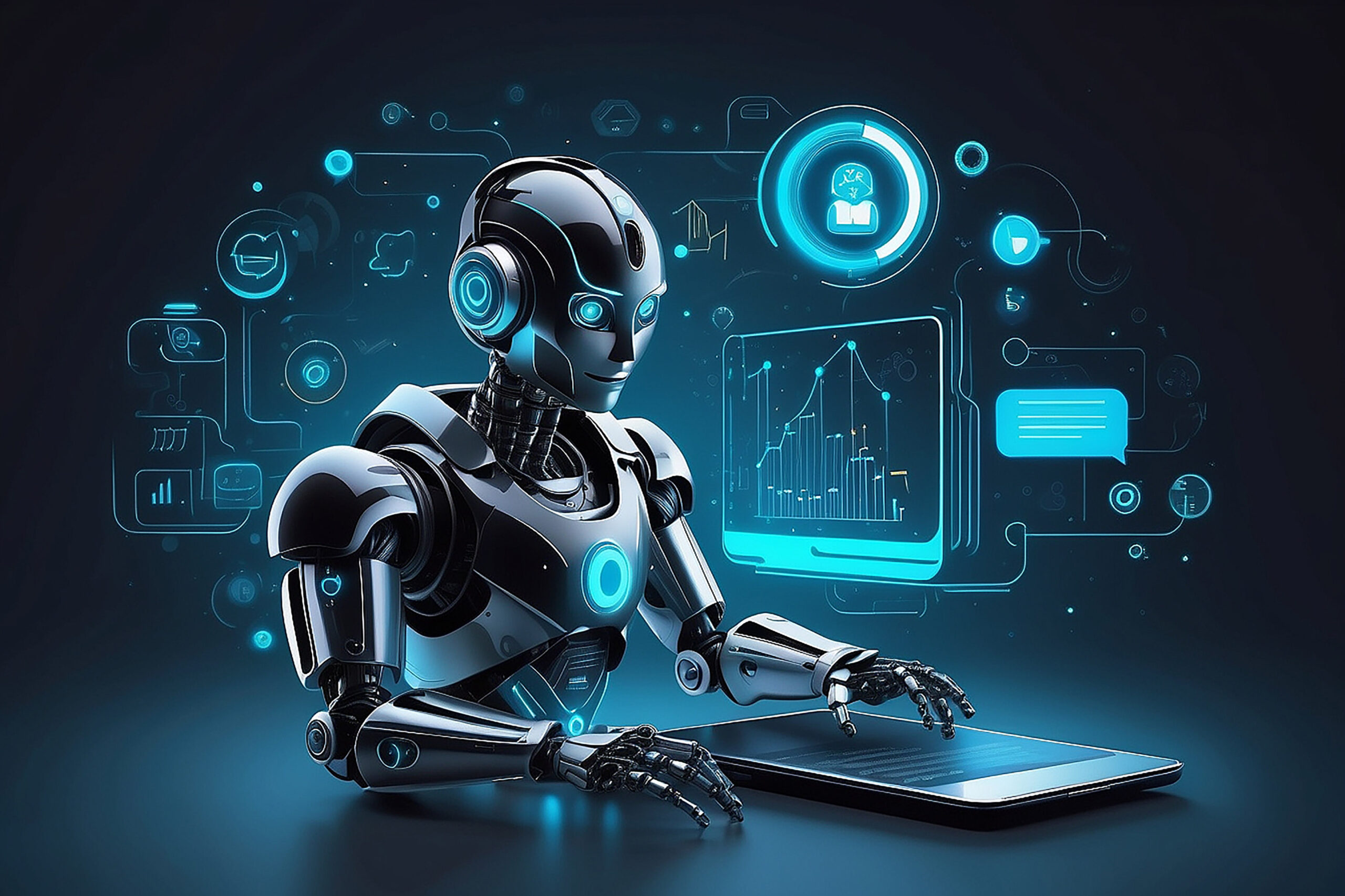8 Best AI Tools for Business Operations That Boost Efficiency
Revolutionizing Business Processes with Cutting-Edge AI Solutions
In today’s rapidly evolving business landscape, the best AI tools for business operations have become indispensable for companies seeking to optimize their processes and stay ahead of the competition.
These innovative solutions are transforming the way organizations operate, offering unprecedented levels of efficiency, accuracy, and productivity.
From automating routine tasks to providing deep insights through data analysis, AI tools are reshaping every aspect of business operations.
As we delve into the world of artificial intelligence in the corporate sphere, we’ll explore how these advanced technologies are streamlining workflows, enhancing decision-making, and driving growth across various industries.
The best AI tools for business operations are not just luxuries but necessities for modern enterprises looking to thrive in an increasingly digital and competitive market.
By leveraging these powerful AI-driven solutions, companies can unlock new potentials, reduce operational costs, and focus on strategic initiatives that propel their business forward.
In this comprehensive guide, we’ll examine eight of the best AI tools for business operations that are making waves in the business world, each offering unique capabilities to boost efficiency and drive success.
We strongly recommend that you check out our guide on how to take advantage of AI in today’s passive income economy.
Table of Contents
Transforming Enterprises with AI-Powered Efficiency
1. Salesforce Einstein: AI-Driven Customer Relationship Management
Salesforce Einstein stands out as one of the best AI tools for business operations, particularly in the realm of customer relationship management (CRM).
This powerful AI platform is seamlessly integrated into Salesforce’s suite of products, offering businesses a comprehensive solution for managing customer interactions and sales processes.
Einstein’s AI capabilities enable it to analyze vast amounts of customer data, providing valuable insights and predictions that help sales teams prioritize leads, identify cross-selling opportunities, and personalize customer experiences.
By leveraging natural language processing and machine learning algorithms, Einstein can automate routine tasks such as data entry and lead scoring, freeing up sales representatives to focus on building relationships and closing deals.
The platform’s ability to forecast sales trends and customer behavior patterns makes it an invaluable asset for strategic planning and resource allocation.
With features like Einstein Voice, which allows users to update records and create tasks using voice commands, Salesforce Einstein is continually pushing the boundaries of what’s possible in AI-enhanced CRM.
As one of the best AI tools for business operations, Salesforce Einstein demonstrates how AI can transform customer relationship management, driving efficiency and growth across sales, marketing, and customer service departments.
2. IBM Watson: Cognitive Computing for Complex Problem-Solving
IBM Watson has earned its reputation as one of the best AI tools for business operations by offering a suite of AI-powered services that can tackle complex business challenges across various industries.
Watson’s cognitive computing capabilities enable it to process and analyze vast amounts of structured and unstructured data, providing insights and recommendations that can inform critical business decisions.
From healthcare diagnostics to financial risk assessment, Watson’s applications are diverse and far-reaching, making it a versatile tool for businesses of all sizes.
One of Watson’s key strengths is its natural language processing abilities, which allow it to understand and respond to human queries in a conversational manner.
This feature has made Watson particularly useful in customer service applications, where it can handle a large volume of customer inquiries efficiently and accurately.
In addition to its customer-facing applications, Watson’s data analysis capabilities make it an invaluable tool for internal business operations, helping companies optimize their supply chains, improve product development processes, and enhance operational efficiency.
As one of the best AI tools for business operations, IBM Watson exemplifies how advanced AI can be applied to solve complex business problems and drive innovation across multiple sectors.
3. UiPath: Robotic Process Automation for Streamlined Workflows
UiPath has emerged as one of the best AI tools for business operations in the field of robotic process automation (RPA).
This powerful platform enables businesses to automate repetitive, rule-based tasks across various departments, significantly improving operational efficiency and reducing the likelihood of human error.
UiPath’s AI-driven bots can handle a wide range of tasks, from data entry and invoice processing to more complex operations involving multiple systems and applications.
One of UiPath’s key strengths is its user-friendly interface, which allows even non-technical users to create and deploy automation workflows with minimal coding knowledge.
This democratization of automation empowers employees at all levels to contribute to process improvement initiatives.
The platform’s AI capabilities extend beyond simple task automation, incorporating machine learning algorithms that can adapt to changes in processes and learn from human interactions to improve performance over time.
UiPath’s analytics features provide valuable insights into automated processes, helping businesses identify bottlenecks and opportunities for further optimization.
As one of the best AI tools for business operations, UiPath demonstrates how RPA can transform business processes, freeing up human resources to focus on more strategic, value-adding activities.
4. Google Cloud AI Platform: Comprehensive AI and Machine Learning Solutions
Google Cloud AI Platform stands out as one of the best AI tools for business operations, offering a comprehensive suite of machine learning and artificial intelligence services.
This platform provides businesses with the tools and infrastructure needed to develop, train, and deploy AI models at scale, making it an ideal solution for companies looking to leverage AI across their operations.
One of the key advantages of Google Cloud AI Platform is its ability to handle large-scale data processing and analysis, enabling businesses to extract valuable insights from vast amounts of structured and unstructured data.
The platform’s pre-built APIs for vision, natural language processing, and speech recognition allow companies to quickly implement AI capabilities without the need for extensive in-house expertise.
Google Cloud AI Platform also offers AutoML, a suite of products that enables developers with limited machine learning expertise to train high-quality models specific to their business needs.
This democratization of AI technology makes it accessible to a wider range of businesses, regardless of their size or technical resources.
For more advanced users, the platform provides tools for building custom machine learning models using TensorFlow and other popular frameworks.
As one of the best AI tools for business operations, Google Cloud AI Platform exemplifies how cloud-based AI services can empower businesses to innovate and optimize their processes across various domains.
5. Tableau: AI-Enhanced Data Visualization and Business Intelligence
Tableau has established itself as one of the best AI tools for business operations in the realm of data visualization and business intelligence.
This powerful platform combines intuitive data visualization capabilities with AI-driven insights, enabling businesses to make data-informed decisions quickly and effectively.
Tableau’s AI features, such as Explain Data and Ask Data, use natural language processing to allow users to interact with their data in a more conversational manner.
These tools can automatically generate insights and explanations for data trends, helping users uncover hidden patterns and anomalies that might otherwise go unnoticed.
The platform’s machine learning capabilities can also suggest relevant visualizations based on the data being analyzed, streamlining the process of creating impactful dashboards and reports.
Tableau’s AI-driven forecasting features enable businesses to make more accurate predictions about future trends, aiding in strategic planning and resource allocation.
The platform’s ability to integrate with a wide range of data sources, including big data platforms and cloud services, makes it a versatile tool for businesses of all sizes and across various industries.
As one of the best AI tools for business operations, Tableau demonstrates how AI can enhance data analysis and visualization, empowering businesses to derive actionable insights from their data more efficiently.
6. Workday: AI-Powered Human Capital Management and Financial Planning
Workday has emerged as one of the best AI tools for business operations, particularly in the areas of human capital management (HCM) and financial planning.
This cloud-based platform leverages AI and machine learning to streamline various HR and financial processes, offering businesses a comprehensive solution for managing their workforce and financial resources.
In the realm of HCM, Workday’s AI capabilities enable predictive analytics for talent management, helping businesses identify high-potential employees, predict turnover risks, and optimize workforce planning.
The platform’s machine learning algorithms can analyze vast amounts of employee data to provide insights into performance trends, skill gaps, and career development opportunities.
On the financial side, Workday’s AI-driven forecasting and budgeting tools help businesses make more accurate financial projections and optimize resource allocation.
The platform’s anomaly detection capabilities can automatically flag unusual transactions or patterns, enhancing financial control and reducing the risk of fraud.
Workday’s natural language processing features allow users to interact with the system using conversational queries, making it easier for non-technical users to access and analyze complex data.
As one of the best AI tools for business operations, Workday showcases how AI can transform core business functions like HR and finance, driving efficiency and strategic decision-making.
7. Zendesk: AI-Enhanced Customer Service and Support
Zendesk has established itself as one of the best AI tools for business operations in the customer service and support sector.
This comprehensive platform integrates AI capabilities to streamline customer interactions, improve response times, and enhance overall customer satisfaction.
At the heart of Zendesk’s AI offerings is its Answer Bot, which uses natural language processing to understand customer queries and provide instant, accurate responses.
This AI-powered chatbot can handle a significant portion of customer inquiries automatically, freeing up human agents to focus on more complex issues.
Zendesk’s AI also extends to ticket routing and prioritization, using machine learning algorithms to analyze incoming support tickets and direct them to the most appropriate agent or department.
This intelligent routing system helps reduce response times and ensures that customer issues are resolved more efficiently.
The platform’s predictive analytics capabilities enable businesses to anticipate customer needs and potential issues before they arise, allowing for proactive customer service.
Zendesk’s AI-driven insights also help businesses identify trends in customer feedback, enabling them to make data-informed decisions about product improvements and service enhancements.
As one of the best AI tools for business operations, Zendesk demonstrates how AI can revolutionize customer service, improving efficiency and customer satisfaction simultaneously.
8. Sisense: AI-Driven Business Analytics and Data Science
Sisense rounds out our list of the best AI tools for business operations with its powerful business analytics and data science platform.
This innovative solution combines advanced AI capabilities with user-friendly interfaces, making complex data analysis accessible to users across all levels of an organization.
Sisense’s AI-driven analytics engine can process vast amounts of data from multiple sources, uncovering insights and patterns that might be missed by traditional analysis methods.
The platform’s natural language querying feature allows users to ask questions about their data in plain language, receiving instant visualizations and insights in response.
Sisense’s machine learning algorithms can automatically identify anomalies and trends in data, alerting users to potential issues or opportunities in real-time.
The platform’s predictive analytics capabilities enable businesses to forecast future trends and outcomes, aiding in strategic planning and decision-making.
Sisense’s AI extends to data preparation as well, automating much of the process of cleaning and structuring data for analysis, saving time and reducing the potential for human error.
As one of the best AI tools for business operations, Sisense exemplifies how AI can democratize data analysis, enabling businesses to derive actionable insights from their data more quickly and efficiently.
Conclusion: Embracing AI for Business Transformation
As we’ve explored in this comprehensive guide, the best AI tools for business operations are revolutionizing the way companies operate across various domains.
From customer relationship management and data analysis to process automation and human capital management, AI is driving efficiency, accuracy, and innovation in every aspect of business operations.
The eight tools we’ve discussed – Salesforce Einstein, IBM Watson, UiPath, Google Cloud AI Platform, Tableau, Workday, Zendesk, and Sisense – represent some of the most powerful and versatile AI solutions available to businesses today.
Each of these platforms offers unique capabilities that can significantly enhance operational efficiency and drive business growth.
As AI technology continues to evolve, we can expect these tools to become even more sophisticated, offering even greater benefits to businesses that embrace them.
The best AI tools for business operations are not just about automating tasks or processing data faster; they’re about transforming the way businesses operate, make decisions, and interact with their customers.
By leveraging these AI-powered solutions, companies can gain a competitive edge, unlock new opportunities, and position themselves for success in an increasingly digital and data-driven business landscape.
As we look to the future, it’s clear that AI will play an increasingly central role in business operations across all industries.
The companies that recognize this trend and proactively adopt the best AI tools for business operations will be well-positioned to thrive in the rapidly evolving business environment of the 21st century.
Frequently Asked Questions
How AI can enhance overall business operations?
AI can enhance overall business operations in numerous ways:
- Improved Efficiency: AI automates repetitive tasks, freeing up human resources for more strategic work.
- Enhanced Decision-Making: AI analyzes vast amounts of data to provide insights for better decision-making.
- Personalized Customer Experiences: AI enables businesses to offer tailored products and services based on individual customer preferences and behaviors.
- Predictive Analytics: AI can forecast trends, helping businesses anticipate market changes and customer needs.
- Cost Reduction: By automating processes and optimizing resource allocation, AI can significantly reduce operational costs.
- 24/7 Availability: AI-powered chatbots and systems can provide round-the-clock service, improving customer satisfaction.
- Error Reduction: AI minimizes human errors in data entry, calculations, and other routine tasks.
- Scalability: AI systems can easily scale to handle increased workloads without a proportional increase in costs.
How can AI be used in operations?
AI can be used in various aspects of business operations:
- Supply Chain Management: AI can optimize inventory levels, predict demand, and improve logistics.
- Human Resources: AI can assist in recruitment, employee onboarding, and performance management.
- Financial Operations: AI can automate accounting processes, detect fraud, and provide financial forecasting.
- Customer Service: AI-powered chatbots can handle customer queries and provide instant support.
- Quality Control: AI can detect defects in manufacturing processes with greater accuracy than human inspectors.
- Marketing and Sales: AI can analyze customer data to create targeted marketing campaigns and predict sales trends.
- IT Operations: AI can monitor network performance, detect security threats, and automate routine maintenance tasks.
- Research and Development: AI can analyze market trends and customer feedback to guide product development.
How can open AI help businesses?
Open AI can help businesses in several ways:
- Innovation: Open AI models can be customized and adapted for specific business needs, fostering innovation.
- Cost-Effectiveness: Open-source AI tools can reduce the costs associated with AI implementation.
- Collaboration: Open AI encourages knowledge sharing and collaboration within the business community.
- Rapid Development: Businesses can leverage pre-trained models to quickly develop AI applications.
- Transparency: Open AI allows businesses to understand and trust the AI systems they’re using.
- Skill Development: Employees can learn and experiment with open AI tools, enhancing the company’s overall AI capabilities.
- Competitive Advantage: Early adoption of open AI technologies can give businesses an edge over competitors.
- Scalability: Open AI platforms often offer scalable solutions that can grow with the business.
How can AI be used to automate business processes?
AI can automate business processes in various ways:
- Robotic Process Automation (RPA): AI-powered bots can automate repetitive, rule-based tasks across different applications.
- Intelligent Document Processing: AI can extract, categorize, and process information from various document types.
- Workflow Automation: AI can manage and optimize complex business workflows, ensuring tasks are completed efficiently.
- Predictive Maintenance: In manufacturing, AI can predict when equipment needs maintenance, reducing downtime.
- Automated Customer Service: AI chatbots can handle customer inquiries, process orders, and provide support.
- Data Analysis and Reporting: AI can automatically analyze data and generate reports, saving time for decision-makers.
- Automated Quality Control: In production environments, AI can automatically detect and flag defects.
- Smart Inventory Management: AI can automate inventory tracking, reordering, and optimization based on demand predictions.

We strongly recommend that you check out our guide on how to take advantage of AI in today’s passive income economy.




